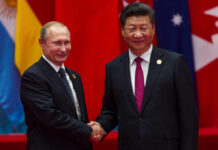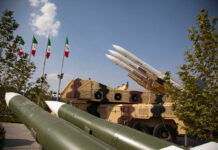
U.S. Marines detained an Army veteran for briefly crossing a restricted boundary in Los Angeles, setting off a debate about military authority in civilian spaces.
At a Glance
- Marines temporarily detained 27-year-old Army veteran Marcos Leao after he went under a yellow boundary tape at a federal facility in Los Angele
- U.S. Northern Command confirmed Marines acted under appropriate legal authority, stating they can temporarily detain individuals but cannot make arrests
- Leao, who was visiting the Department of Veterans Affairs, complied with instructions and reported being treated fairly
- This marks the first known detention related to Marines’ deployment in Los Angeles amid ongoing protests
- The incident has sparked mixed public reactions about military presence in urban settings
Detention Details and Legal Authority
U.S. Marines stationed at a federal facility in Los Angeles detained a civilian who attempted to cross under a yellow boundary tape marking a restricted area. The detained individual was later identified as Marcos Leao, a 27-year-old Army veteran who was visiting the Department of Veterans Affairs. Officials determined Leao posed no threat and promptly released him, with the entire incident being resolved without escalation or formal charges.
U.S. Northern Command, which oversees military operations within North America, issued a statement confirming that the Marines acted within their legal authority. Under specific circumstances, military personnel can temporarily detain individuals who breach security perimeters or restricted areas at federal facilities. However, it’s important to note that Marines do not possess civilian arrest powers. Their authority extends only to holding individuals until they can be transferred to appropriate civilian law enforcement agencies.
Veteran’s Response to Detention
According to reports, Leao cooperated fully with the Marines throughout the brief detention. When interviewed afterward, he expressed no complaints about his treatment, stating that the Marines had acted professionally and treated him fairly. The veteran explained that he had simply been attempting to reach his appointment at the Department of Veterans Affairs when he inadvertently crossed the restricted boundary.
This incident represents the first known civilian detention carried out by Marines since their deployment to Los Angeles. The deployment came amid heightened security concerns and ongoing protests in various parts of the city. While the detention itself was resolved quickly and without incident, it has highlighted questions about the role and jurisdiction of military personnel in civilian spaces during periods of unrest.
Public Reaction and Broader Implications
The detention has generated significant public discourse on social media platforms and news outlets. Some observers view the Marines’ actions as an appropriate security measure at a federal facility, while others have expressed concern about what they perceive as potential overreach of military authority in civilian settings. These divided reactions reflect broader societal tensions regarding the balance between security measures and civil liberties.
The presence of Marines in Los Angeles coincides with enforcement actions by the Department of Homeland Security and local law enforcement agencies responding to protests and unrest. This coordination between military and civilian authorities has created a complex operational environment with significant legal, physical, and emotional dimensions for both residents and officials.
As urban areas across the nation grapple with various security challenges, this incident serves as a case study in the evolving relationship between military capabilities and civilian oversight. The resolution of Leao’s detention without escalation demonstrates established protocols working as intended, though questions about the appropriate scope of military involvement in civilian spaces remain a subject of ongoing national debate.

























